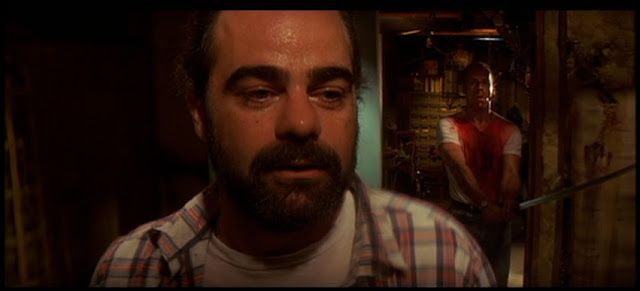This 'sync' video, which is linked to near the bottom of this post, pairs Pink Floyd's song, One Of These Days, with part of the visual portion of Quentin Tarantino's film, Pulp Fiction. It illustrates how the feel of the alchemical nigredo stage, which is associated with chaos and the encounter with one's psychological shadow, is conveyed both in the chaotic basement scene in Tarantino's film, and in the sound of the song it is here synced to. 'The Gimp', dressed in black leather in this scene, represents Butch Coolidge's psychological shadow (in specific, he represents Butch's repressed weaknesses); in this scene, Butch (in white t-shirt) defeats his own shadow by punching The Gimp, knocking him unconscious and leaving him hanging from his neck by a strap or chain wrapped around it (below left screencap; click image to enlarge), thus killing him. The full lyrics of One Of These Days are, "One of these days I'm going to cut you into little pieces"; in the sync video, these lyrics are heard while Butch, holding a Samurai sword, is sneaking up on Maynard (below right; Maynard is the man with the beard), about to kill him with the sword.

The sync video can be viewed on YouTube here. One Of These Days is from Pink Floyd's 1971 album, Meddle. Pulp Fiction was released in 1994. See the analysis of Pulp Fiction on this blog for a detailed explanation of the film's themes.
All song lyrics in this post are believed to be used in accordance with the U.S. Copyright Fair Use Act (Title 17, U.S. Code).
